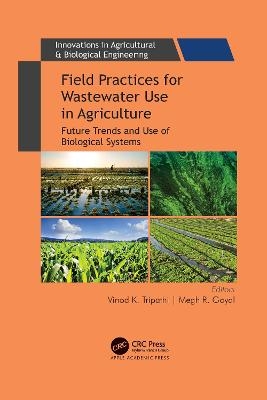
Field Practices for Wastewater Use in Agriculture
Apple Academic Press Inc. (Verlag)
978-1-77463-768-5 (ISBN)
This book sheds light on the vast potential of wastewater use in agricultural irrigation while also considering safety of the agricultural products for human consumption. Much emphasis has also been given to technological aspects for the treatment of wastewater to protect our environment for better public health protection.
Vinod Kumar Tripathi, PhD, is an Assistant Professor in the Department of Farm Engineering at Banaras Hindu University, Varanasi, Uttar Pradesh, India. Megh R. Goyal, PhD, PE, is a Retired Professor in Agricultural and Biomedical Engineering from the General Engineering Department in the College of Engineering at the University of Puerto Rico–Mayaguez Campus.
Part 1: Prospects of Wastewater Use in Agriculture 1. Water Footprints of Sustainable Agriculture: An Appropriation of Fresh and Wastewater 2. Heavy Metal Accumulation in Crops: Status, Sources, Risks, and Management Strategies 3. Wastewater Use in Agriculture: An Emerging Issue and Current and Future Trends Part 2: Wastewater Management with Biological Systems 4. Microorganism-Based Biological Agents in Wastewater Treatment: Potential Use and Benefits in Agriculture 5. Biosorption of Heavy Metals by Cyanobacteria from Textile Effluents 6. Water Quality Improvement: Use of Indigenous Plant Materials 7. Impact of Biofilm on Clogging of Drip Irrigation Emitters Part 3: Wastewater Use: Principles and Field Practices 8. Sustainable Soil Conservation and Management: Principles, Issues, and Strategies 9. Ex-Situ and in-Situ Crop Residue Management Technologies in Tropical Countries 10. Analysis of Groundwater Level: Groundwater Modeling Using GIS in Kolkata 11. Disposal of Effluents from Pulp and Paper Industries through Irrigation Part 4: Case Studies 12. Correlation Analysis of Municipal Sewage Discharge in River Ganges: Varanasi, India 13. Mapping of Normalized Difference Dispersal Index for Groundwater Quality Study on Parameter-Based Index for Irrigation: Kanchipuram District, India 14. Runoff and Sediment Estimation using ANN and ANFIS: Case Study of Godavari Basin, India
| Erscheinungsdatum | 16.09.2022 |
|---|---|
| Reihe/Serie | Innovations in Agricultural & Biological Engineering |
| Zusatzinfo | 46 Tables, black and white; 36 Illustrations, color; 34 Illustrations, black and white |
| Verlagsort | Oakville |
| Sprache | englisch |
| Maße | 156 x 234 mm |
| Gewicht | 453 g |
| Themenwelt | Naturwissenschaften ► Biologie ► Ökologie / Naturschutz |
| Naturwissenschaften ► Geowissenschaften ► Hydrologie / Ozeanografie | |
| Technik ► Umwelttechnik / Biotechnologie | |
| Weitere Fachgebiete ► Land- / Forstwirtschaft / Fischerei | |
| ISBN-10 | 1-77463-768-5 / 1774637685 |
| ISBN-13 | 978-1-77463-768-5 / 9781774637685 |
| Zustand | Neuware |
| Haben Sie eine Frage zum Produkt? |
aus dem Bereich


